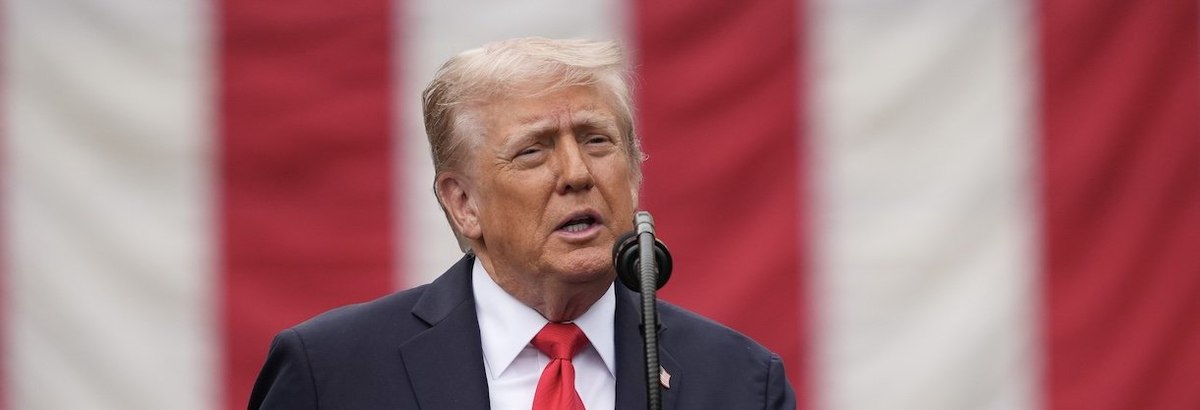Overview
This week’s Economist/YouGov poll covers…
- A new low for Trump's second-term approval
- Rising concern about Trump's age and falling regard for his presidential qualities
- Americans' reactions to the Charlie Kirk shooting
- Poor perception of the Democratic Party's leadership
- Whether people think Trump wrote the Epstein birthday message
- What Americans do and don't support in immigration enforcement
Trump approval falls to new second-term low
- 39% of Americans strongly or somewhat approve of Donald Trump's job performance as president, while 57% disapprove
- The 39% of Americans who approve of Trump is the lowest share to do so in any weekly Economist / YouGov Poll in Trump's second term
- The 57% who disapprove is the most to do so in Trump's second term
- Trump's net approval rating (the share who approve minus the share who disapprove) is -18, the lowest of his second term
- Trump's -18 net approval is also the second-lowest net approval Trump has received in any Economist / YouGov poll in either of his two terms to date
- It trails only Trump's net approval of -21 recorded November 10 - 14, 2017
- Trump's November 2017 low was a one-time blip; his approval rose the next week and within two weeks was back at a more typical level for that time in Trump's first term. It's too early to say whether this week's drop in job approval is durable or temporary
- At least 50% of the following groups disapprove of Trump's job performance: Democrats and Independents, men and women, white, Black and Hispanic Americans, and Americans age 18-29, 30-44, 45-64, and 65 and older
- More Americans than in recent weeks also disapprove of Trump's handling of several major issues, including crime (net approval of -7), immigration (-8), jobs and the economy (-22) and inflation and prices (-34).
- Trump's net approval on his handling of crime, jobs and the economy, and inflation and prices are all at new lows for his second term
- Americans' negative views on Trump's handling of the economy are particularly striking. Views on how Trump is handling immigration, for example, are similar to where they were at this point in his first term:
- But the predominantly negative views about how Trump is handling jobs and the economy contrast sharply with Trump's first term, when he usually had a positive net approval on the economy
Trump's personal and leadership qualities
- 34% of Americans say Donald Trump's health and age are severely limiting his ability to do the job of president, while 27% say it's having little effect and 26% say it's having no effect at all
- The 34% who say Trump's health and age are severely limiting his ability is the greatest share of Americans to say this since Trump's election in November 2024; the 26% who say Trump's health and age are having no effect is the smallest share since the election
- Concern about Trump's health and age remains far below Americans' concern about Joe Biden's health and age a year ago. In August 2024, 60% of Americans said Biden's health and age were severely limiting his ability to do the job of president, while 23% said they were having little effect and only 8% said they were having no effect at all
- On a range of other personal and leadership qualities, Americans are either divided over Trump or more likely to have negative opinions than positive ones
- 50% of Americans say Trump is a very or somewhat strong leader and 50% say he's a weak leader
- 40% say Trump has the temperament to be president and 52% say he does not
- 36% say they are confident in Trump's ability to deal wisely with an international crisis and 53% say they're uneasy
- 30% say they like Trump as a person, a lot or somewhat, while 53% say they dislike him a lot or somewhat, and 13% neither like nor dislike him
- 30% say Trump is honest and trustworthy, and 57% say he is not
- On all five of these qualities, Americans have become more likely to be negative about Trump since his inauguration in January
- At that time, for example, 64% of Americans said Trump was a very or somewhat strong leader, and 38% said he was honest and trustworthy. Those figures are down to 50% and 30% today
Charlie Kirk and political violence
- More believe the person who killed Charlie Kirk was mostly motivated by left-wing beliefs than think the shooter was mostly motivated by right-wing ones (37% vs. 17%). 16% think the shooter was motivated by something other than political beliefs and 30% aren't sure
- Two-thirds (68%) of Republicans think Kirk's killer was motivated mostly by left-wing beliefs; 4% say it was right-wing beliefs, 11% say something other than politics, and 16% aren't sure
- Democrats are more mixed: 10% say the killer was motivated by left-wing beliefs, 33% say right-wing beliefs, 20% say something other than politics, and 37% aren't sure
- Republicans are far more likely than Democrats to say they were at least somewhat familiar with Kirk before the week he was killed (72% vs. 41%); only 18% of Republicans say they had never heard of him, compared to 38% of Democrats
- Americans are about equally likely to say they have a favorable and an unfavorable view of Kirk (35% vs. 36%); 18% say they have neither a favorable nor an unfavorable opinion of him and 11% say they don't know
- The vast majority (83%) of Americans say that the U.S. has grown much more (67%) or somewhat more (16%) politically divided in the past five years; only 4% say the country has become less divided
- Since we last posed this question in June, there has been a 9-point increase in the share of Americans saying the U.S. has grown much more divided
- Most people (83%) also believe that compared to a decade ago, there is more political violence in the U.S.; only 3% say political violence has decreased
- 78% of Americans — including 75% of Democrats and 89% of Republicans — say that violence is never justified in order to achieve political goals. Adults under 30 are less likely to say it is never justified than are older Americans (63% vs. 82%) and men are less likely than women to say it never justified (72% vs. 84%)
- Americans are equally likely to say they are very concerned about right-wing extremism and left-wing extremism (40% vs. 40%)
- Concerns about left-wing extremism have risen since October 2024; at that point, more were very concerned about extremism among the right-wing than among the left-wing (39% vs. 34%)
- Slightly more Americans say that political violence in the U.S. is committed more often by people on the left than by people on the right (33% vs. 29%); 24% say violence is committed equally by both groups
- Far more Americans would like for laws covering the sale of handguns in the U.S. to be made more strict than to be made less strict (54% vs. 9%); 28% say there should be no change in the law
- More Americans strongly or somewhat disagree than agree (52% vs. 30%) with Kirk's 2023 statement that, "I think it’s worth [it] to have a cost of, unfortunately, some gun deaths every single year so that we can have the Second Amendment to protect our other God-given rights"; respondents were not told who made the statement
Party politics
- While more Americans have negative than positive views of both the Democratic and Republican parties, net favorability is higher for the Republican Party than for the Democratic Party (-17 vs. -26)
- Republican Party favorability has been higher than the Democratic Party's since soon after the 2024 election; for the seven years before then, the Democratic Party generally was viewed more favorably than the Republican Party
- About twice as many Americans believe that the leadership of the Republican Party is very or somewhat effective as say the same about the leadership of the Democratic Party (52% vs. 25%)
- Republicans are especially likely to believe their own party's leadership is effective compared to the share of Republicans who believe the same about the Democratic Party's leadership (83% vs. 14%)
- Democrats also are more likely to believe their party's leadership is effective than to believe so of Republican leaders, though by a much smaller margin (49% vs. 33%)
- The Republican Party is viewed as more unified than the Democratic Party; 47% say Republicans are more unified than divided while only 25% say the same of Democrats
- Republicans are far more likely to view their own party as unified than to view the opposition party as such (67% vs. 18%)
- Democrats are only slightly more likely to view their own party as unified than to say so about the Republican Party (44% vs. 38%)
- The Democratic Party is far more likely than the Republican Party to be described as woke (39% vs. 4%); more also say it is out-of-touch (45% vs. 38%), weak (41% vs. 22%), and compassionate (29% vs. 19%)
- The Republican Party is more likely than the Democratic Party to be viewed as corrupt (47% vs. 39%), extreme (40% vs. 33%), intolerant (37% vs. 27%), and evil (32% vs. 27%); however, more also say it is principled (27% vs. 21%) and optimistic (25% vs. 21%)
- Very few Americans describe either political party as trustworthy or pragmatic
- More Americans say they would vote for the Democratic than the Republican candidate for Congress if elections were being held today in the district where they live (37% vs. 33%, including 43% vs. 41% among registered voters)
- However, more expect that in 2026, Republicans rather than Democrats will win majority control of the U.S. House of Representatives (39% vs. 27%)
- Looking ahead to the 2028 presidential election, Americans are more likely to say they will definitely or probably vote for the Democratic candidate than for the Republican one (37% vs. 34%, including 42% vs. 41% among registered voters)
- Despite the edge for Democrats in voting intent, more Americans expect that a Republican rather than a Democrat will win the 2028 presidential election (36% vs. 26%)
The Epstein investigation
- Net approval of Trump's handling of the Jeffrey Epstein investigations has fallen in the past week to -42 — meaning the share of Americans who strongly or somewhat disapprove of his handling is 42 points higher than the share who approve. It fell 7 points among all Americans in the past week and 12 points among Democrats; among Republicans, it increased 2 points
- About two-thirds (68%) of Americans think Trump knew some (23%) or a lot (45%) about the sex crimes committed by Epstein against underage girls before investigations into Epstein began; only 9% say he knew nothing about them
- 44% of Americans think Trump was involved in crimes allegedly committed by Epstein; 31% believe he wasn't
- The survey showed respondents an image of the birthday message allegedly written for Epstein by Trump in 2003 and asked whether they think that it was from Trump (Trump has denied writing the message). Nearly twice as many say that it was from Trump as say it wasn't (44% vs. 23%); 33% aren't sure
- Only 8% of Republicans believe Trump wrote the Epstein birthday card; half (52%) say he did not. 81% of Democrats think the card was written by Trump; only 2% say it wasn't
- Far more Americans describe the birthday card shown to them as more disturbing than playful, than as more playful (61% vs. 13%)
- The vast majority (88%) of those who think Trump wrote the card see it as more disturbing and only 5% say it is more playful; among those who think Trump didn't write it, 39% say it is more disturbing and 21% say it is more playful
Immigration enforcement
- Nearly two-thirds (66%) of Americans believe that federal immigration agents should not be allowed to stop people based solely on factors such as their race or ethnicity, language, or field of work; 19% say they should be allowed to
- About two-thirds (65%) of Americans say that citizens should not be required to carry proof of their citizenship, such as a passport or birth certificate; 19% think they should be required to
- Most Americans say U.S. Immigration and Customs Enforcement (ICE) officers should be required to wear uniforms when making arrests: 65% say they should and 19% say they shouldn't
- Americans are split over whether ICE officers should be allowed to wear masks that hide their identities while making arrests; somewhat more say they shouldn't be allowed to than say they should (49% vs. 37%)
— Carl Bialik contributed to this article
Throughout this report, some numbers may appear to be off by 1 because of rounding
See the toplines and crosstabs for the September 12 - 15, 2025 Economist/YouGov Poll
Methodology: The poll was conducted among 1,567 U.S. adult citizens. Respondents were selected from YouGov’s opt-in panel to be representative of U.S. adult citizens. A random sample (stratified by gender, age, race, education, geographic region, and voter registration) was selected from the 2019 American Community Survey. The sample was weighted according to gender, age, race, education, 2024 presidential vote, 2020 election turnout and presidential vote, baseline party identification, and current voter registration status. 2024 presidential vote, at time of weighting, was estimated to be 48% Harris and 50% Trump. Demographic weighting targets come from the 2019 American Community Survey. Baseline party identification is the respondent’s most recent answer given around November 8, 2024, and is weighted to the estimated distribution at that time (31% Democratic, 32% Republican). The margin of error for the overall sample is approximately 3.5%.
Image: Getty (Andrew Harnik / Staff)
What do you really think about President Trump, American politics in general, and everything else? Share your reality, join the YouGov panel, and get paid to share your thoughts. Sign up here.
















